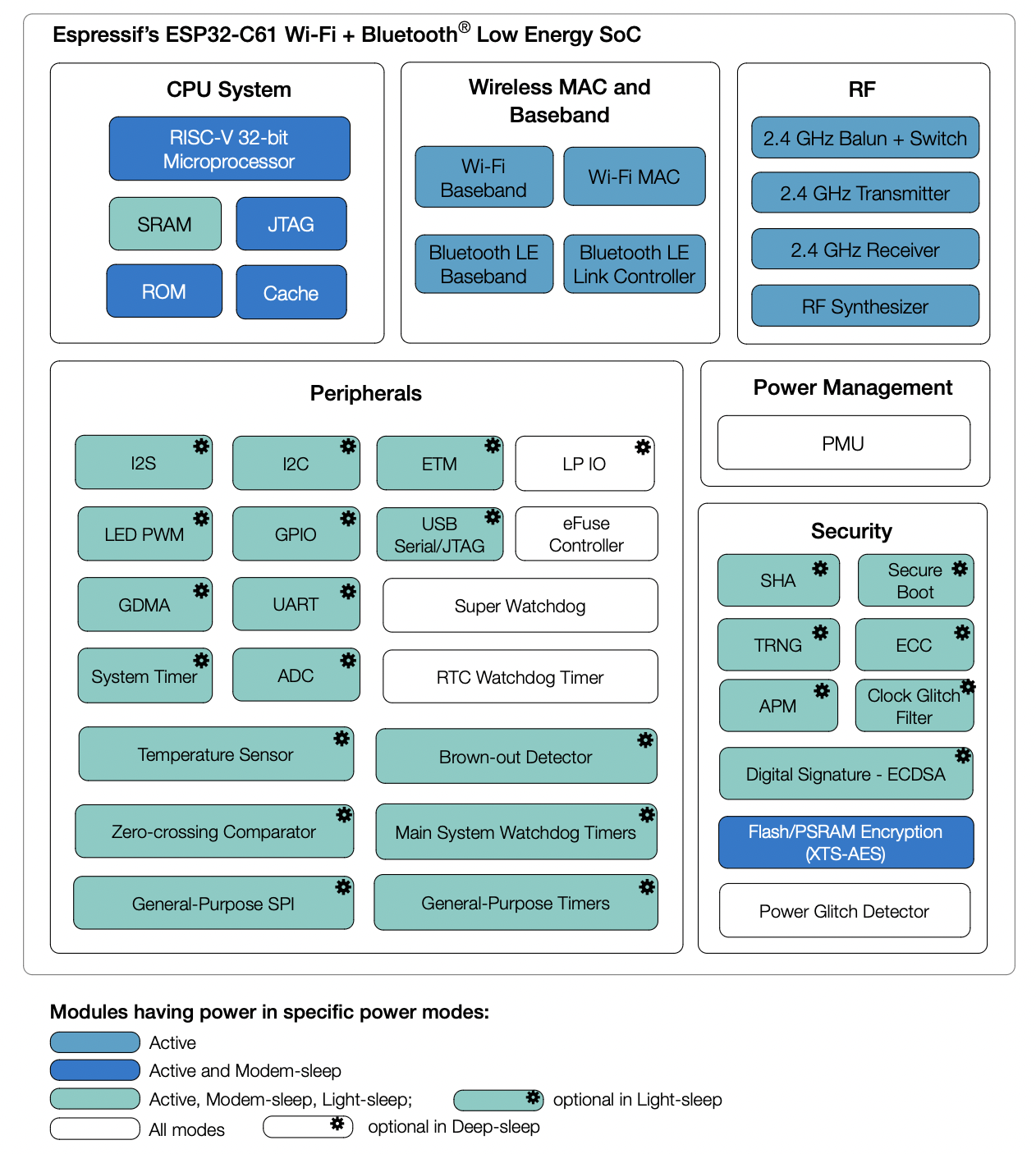- Home
- Hardware
- SDKs
- Cloud
- Solutions
- Support
- Ecosystem
- Company
- Contact
news
ESP32-C61: Delivering Affordable Wi-Fi 6 Connectivity
Shanghai, China
Jan 8, 2024
ESP32-C61 marks Espressif's response to a significant demand for Wi-Fi 6 technology, offering optimized peripherals, improved connectivity, and increased memory options.
Espressif Systems (688018.SH), proudly announces the upcoming release of ESP32-C61, a next-generation Wi-Fi 6 + Bluetooth 5 (LE) System-on-Chip (SoC). Following the success of ESP32-C2 and ESP32-C3, this new SoC marks Espressif's response to a significant demand for Wi-Fi 6 technology, offering optimized peripherals, improved connectivity, and increased memory options.
Wireless Connectivity
The above-mentioned Wi-Fi 6 support is optimized for IoT devices, and the new SoC supports a 20MHz bandwidth for 802.11ax mode, and a 20/40MHz bandwidth for 802.11b/g/n mode. The 802.11ax mode supports features like OFDMA, MU-MIMO, which provide reliable and low-latency connection, along with Target-Wake-Time, which is the basis of ultra-low power applications. Additionally, Bluetooth 5 (LE) radio supports long-range operation through advertisement extension and coded PHY, while also supporting 2 Mbps of high throughput PHY. ESP32-C61 will also support the BLE-Mesh 1.1 protocol.

ESP32-C61 Block Diagram
System and Memory
In terms of CPU, ESP32-C61 has a single-core, 32-bit RISC-V microcontroller that can be clocked up to 160 MHz. It has a 320KB on-chip SRAM, a 256KB ROM, and works with Quad SPI flash. Notably, the SoC introduces support for PSRAM with Quad SPI of up to 120MHz, thus enabling developers to focus on application development without worrying about memory optimization. The larger memory availability also provides better future-proofing for upgrades.
Security
In line with Espressif’s philosophy, ESP32-C61 places a strong emphasis on affordable security, incorporating features such as secure boot, flash and PSRAM encryption, as well as cryptographic accelerators. It also has an ECDSA-based Digital Signature Peripheral in hardware, thus safeguarding private keys from software access. The addition of a Trusted Execution Environment (TEE), using an Access Permission Management (APM) hardware block and Physical Memory Protection (PMP), provides flexibility in application security management.
Optimized Peripherals
ESP32-C61 encompasses standard microcontroller peripherals, such as I2C, I2S, SPI, UART, LED-PWM, ADC, Timers, and DMA. Specialized peripherals include the Event Task Matrix for automation-triggered tasks and the Zero-crossing comparator for easy zero-crossing detection.
ESP32-C61 will be supported through Espressif’s mature IoT Development Framework (ESP-IDF), so that our customers can benefit from their familiarity with our field-proven platform that already powers millions of connected devices. The ESP-Matter SDK will also include support for creating Matter-enabled products with ESP32-C61. With the availability of PSRAM, the ease of development, as well as the applications which can be supported on this unique product are unparalleled. For customers who would like to use ESP32-C61 as a communication co-processor with an external host, ESP-Hosted and ESP-AT firmware will also be available.
If you are interested in the ESP32-C61 series of SoCs, please contact Espressif’s customer support team, who will try to help you as soon as possible.


 LinkedIn
LinkedIn 微信
微信
 Twitter
Twitter Facebook
Facebook